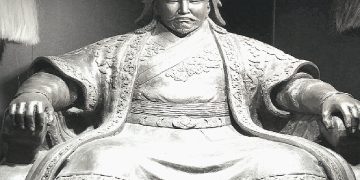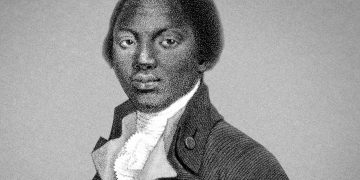Almost everyone knows about the feats of arms of Alexander the Great. The name of the great commander forever entered the history of civilization. However, what preceded his military and political glory and what served as the foundation for the implementation of Alexander’s grandiose plans? Of course, the activities of his father Philip II, who was able to unite the disparate and ever-warring Greek policies within the framework of the Corinthian Union. Subsequently, his son Alexander took advantage of the strong battle-hardened army formed by Philip for great campaigns and the creation of a vast empire. Let’s find out how it all began.
The king of Ancient Macedonia, Philip II, took the throne very young – at 23 years old. In 359 B.C. e. Macedonia was threatened by the invasion of the Illyrians. After the death of King Perdikka III, the country was left without a ruler, with the exception of the infant son of Perdikka III Aminta. The “compassionate” neighbors are Athens, whose influence extended to the north of the Balkan Peninsula, and the Thracians were ready to subjugate a small and weak state to their influence. However, the brother of the murdered king Philip managed to settle the matter, having bought off the Thracians with gold, and from Athens – the city Amphipolis, which they extremely needed. Thanks to this, the people proclaimed Philip king instead of the young Aminta.
Aware of the need to expand the state, Philip began with the army. In his youth, having been a hostage in Thebes, he learned something from one of the best strategists of the time – Epaminondas. It was Philip II of Macedonia that owed the famous phalanx, which only the Roman legion could subsequently surpass. A lot of attention was paid by the king and artillery of that time, for the creation of which he invited the best mechanics from Syracuse.
With such a strong army in reserve, Philip II could seriously think about turning small Macedonia into a rich and influential state. Athens bitterly regretted that flattered by a rich bribe, they disregarded such a nimble young man. Philip took Amphipolis from them, capturing a number of other cities subordinate to Athens, and immediately gave part of them to his eastern neighbors – the Chalkidic Union led by Olinthos, preventing their intention to support Athens. Then Philip, taking advantage of the dispute between Athens and Thebes over the island of Euboea, captured it along with the Panhei region and the gold mines. Using the wealth that was in his hands, Philip began to build a fleet and, through trade, began to actively influence Greece. As a result of the swift action of Philip II, the Chalkidian Union was completely cut off from Central Greece.
In the 4th century BC e. Greece was weakened by the Peloponnesian War and the ongoing decay of the polis. No Greek state could claim the role of unifier or peacemaker. The Greeks complained to each other about and without reason, each time creating new alliances and new enemies. In 355 BC e. Holy War broke out, continuing until 346 BC. e. Residents of the city of Phocis unexpectedly seized the lands belonging to the temple of Apollo. The Squatters tried to curb Thebes. However, the Fokidians in response seized the Temple of Apollo at Delphi and hired a 20-thousand army with the looted money. Since Macedonia and Hellas believed in the same gods, Philip II, at the request of Thebes, immediately acted as an ardent defender of the offended Apollo. Despite a series of setbacks, Philip defeated the Phocian troops in Thessaly (352 BC) and freed Delphi. 3 thousand prisoners in the redemption of sacrilege were drowned in the sea, and the body of their fallen warlord Onomarchus was crucified on the cross. Now it was time to punish the criminal city of Phocis. However, Athens, quickly realizing that the Macedonians just want to get into Central Greece, stood up on their chest in defense of the only way – the Thermopyllic passage.
Philip II, deciding not to tempt fate, turned north. He had long been looking with interest at the rich Olynthos, who was now surrounded on all sides by Macedonian lands, and sentenced: “Either the Olympians must leave their city, or I should leave Macedonia.” Swiftly capturing the small towns of the Chalkidian Union, the Macedonians besieged Olinth. The siege lasted a year. Thanks to Philip’s diplomacy, the help from Athens, which the Chalkidians pleaded for, was late, the city was taken and destroyed in 348 BC. e.
Now the Athenians, who treasured the remnants of their influence in Thrace, agreed to make peace with Macedonia (Filokratov peace – 346 BC) and took the army out of Thermopylae. All the cunning plans to save Phocis were smashed into cunning, treachery and gold of the Macedonian. Phocis fell, and their voices in Amfiktioni (the union of the Greek policies – the guardians of the temple of Apollo at Delphi) went to Philip, who now, like the Hellenes, could intervene in Greek affairs legally. In addition, part of the Greek fortifications on the border of Central Greece and Thermopylae passed to the Macedonian. From now on, the passage to Central Greece was always open for its new owner.
The familiar Hellenic world by the 4th century BC e. began to crumble. And suddenly Heraclides appeared – a descendant of Heracles (namely, Philip II counted his kind from him), who could take on the role of a unifier or a universal enemy, which would also unite the policies. After defeating Phocis, Philip’s popularity in the cities increased.
In all policies, there was a struggle of supporters and opponents of the Macedonian king. The best speakers of Athens, Isocrates, and Aeschines supported Philip, believing that he was that great personality who would revive the ancient Hellas if he united it under his authority. For the sake of the greatness of Greece, they were ready to say goodbye to the independence of their city. Isocrates claimed that the hegemony of Philip would be a blessing because he himself is a Hellenic and a descendant of Heracles. Philip II generously endowed his supporters with gold, rightly believing that “there is no such high city wall through which a donkey loaded with gold could not cross.”
The opponent of Philip, leader of the anti-Macedonian party, Athenian speaker Demosthenes called on the Greeks to fight against the aggressive policy of the Macedonian king. He called Philip an insidious barbarian, seeking to seize Greece. However, it was not the Greeks who had long forgotten what honor was, to reproach Philip for treachery, dishonesty, deceit, dishonesty, and power-loving. How many faithful allies and those who believed the false promises of the opponents left Athens on their historical path, eager for power …
Despite the success of Philip’s supporters, his opponents managed to prevail. Demosthenes was able to convince Athens, and with the other Greek cities, of the need to repulse the hypocritical and aggressive Macedonian. He secured the creation of an anti-Macedonian coalition of Greek policies.
The cunning Philip decided to strike at the Bosporus Thracian and Hellespont straits in order to cut off Middle Greece from its Black Sea possessions. He besieged Byzantium and the Iranian city of Perinf. However, this time, having neutralized the supporters of Macedonia, Athens managed to help Byzantium. Perinf was helped by the indignant Iranian king Darius III. Philip retreated (340 BC). It was a tangible defeat. Middle Greece could rejoice. Philip decided not to tidy up this “hornet’s nest” yet, leaving his supporters, gold and time to act. His patience was not in vain. Greece could not live long in peace. A new Holy War began. This time, the inhabitants of Amphissa, supported by Athens, encroached on the land of the Delphic temple. Amfiktion, at the suggestion of a supporter of Macedonia Aeschine, recalling the zealous defender Delph, asked Philip II to intercede for the insulted deity. Philip rushed to Central Greece faster than the wind, punished Amphiss without effort, and unexpectedly for all and even his friends, the Thessalians took control of the city of Elatea under Kefiss, who was the key to Boeotia and Attica.
Panic began in the Allied camp. Thebes, who was directly in front of the army of Philip II, trembled with fear. However, Demosthenes, who was not taken aback, who arrived in the city, managed to raise the morale of the citizens and persuaded them to join the anti-Macedonian union, headed by long-standing opponents of Thebes – Athens.
The united army marched against the Macedonian king. Philip II even earlier defined his tactics: “I retreated like a ram, to hit harder with my horns.” The opportunity to strike after two unsuccessful battles appeared to him on August 2, 338 BC. e. under Czaronei. For the first time, Alexander participated in this battle – the future Tsar Alexander the Great.
The Battle of Heronius ended with the conquest of Greece by Macedonia. All Greeks and primarily the Athenians were waiting for the massacre and mourned their ancient cities in advance. But Philip treated the conquered surprisingly mildly. He did not demand surrender and offered them an alliance. Greece looked at such a diplomatic, educated and generous Philip with admiration. The insulting nickname “barbarian” was forgotten, and everyone immediately remembered that he was Heraclides.
In 337 BC e. on the initiative of Philip II, a pan-Greek “congress” was convened in Corinth (the dream of Pericles came true!), which formed the Panellian Union — only Sparta did not enter into it — and declared Philip the hegemon of Greece. And in vain Demosthenes at one time scared the Athenians: “He (Philip) is most hated by our free institutions … after all, he knows very well that if he subdues his power over all nations, he will not have a firm hold of anything until you there is a rule of law. ” Philip left the political system of city-states unchanged, and the proclaimed Holy World (finally peace!) Forbade them to interfere in each other’s affairs. Moreover, for the triumph of the pan-Greek idea and the rallying of the Greeks, the Pan-Hellenic Union declared war on the Iranian power, appointing Philip II an autocratic strategist.
But he did not have time to start a new campaign. In 336 B.C. e. Philip was killed. To continue his work was supposed to be so little like father Alexander. If Philip was a genius of diplomacy, then Alexander became the deity of war.












